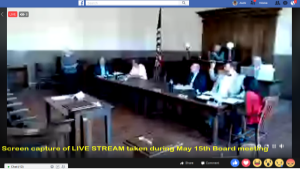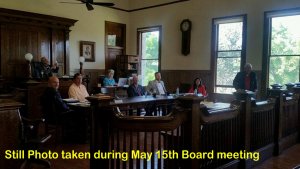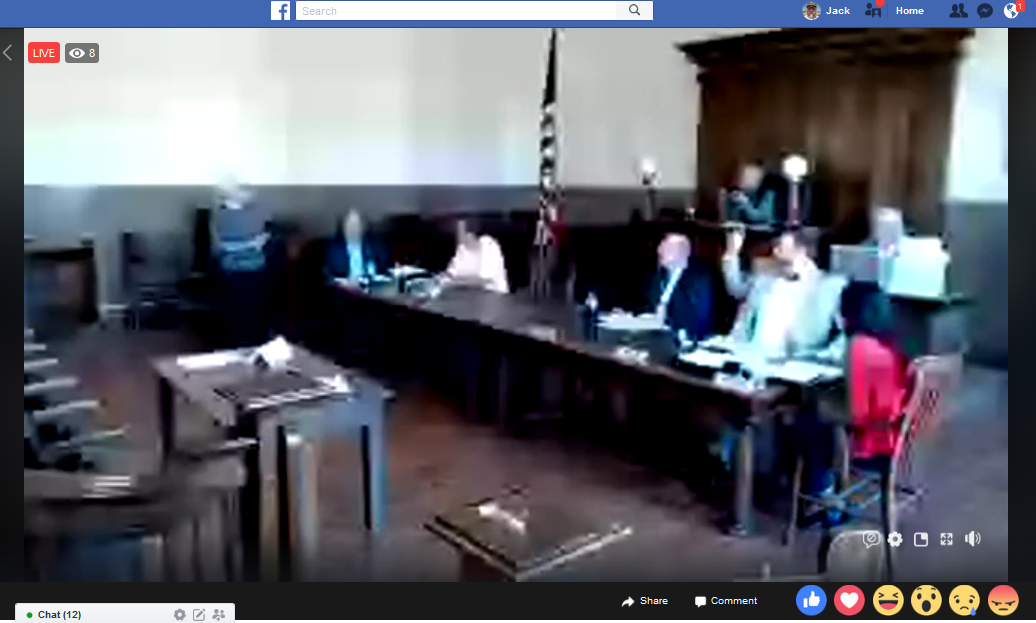 EDITORIAL - In March of 2017 the Madera County Board of Supervisors violated the California Ralph M. Brown Act which insures that public business will be conducted in the public view. During that March meeting the Madera County Board of Supervisors instructed Madera County Department of Corrections Chief Manuel Perez to “fully comply with all U.S. Immigration and Customs Enforcement (ICE) requests” before releasing felons lacking legal permission to live in the U.S. It also said they directed the county counsel’s office to “expedite their actions.” All this was decided during ‘closed session’ but was not on the meetings agenda.
EDITORIAL - In March of 2017 the Madera County Board of Supervisors violated the California Ralph M. Brown Act which insures that public business will be conducted in the public view. During that March meeting the Madera County Board of Supervisors instructed Madera County Department of Corrections Chief Manuel Perez to “fully comply with all U.S. Immigration and Customs Enforcement (ICE) requests” before releasing felons lacking legal permission to live in the U.S. It also said they directed the county counsel’s office to “expedite their actions.” All this was decided during ‘closed session’ but was not on the meetings agenda.
While the Madera County Counsel Regina Garza claimed a lawsuit filed against the county in July of 2017 by the American Civil Liberties Union had no merit, the ACLU asked a Madera County Superior Court judge to declare the county board violated the Brown Act and order the supervisors to comply with the open meeting and notice requirements of the Brown Act. This lawsuit ended up costing the County of Madera over $36K in legal fees the board was forced to pay the ACLU following the settlement of the case.

On May 15th of this year the Madera County Board of Supervisors held their regular meeting on the second floor of the former Madera County Courthouse which now serves as the Madera County Court House Museum. The only problem with this is that the building is not accessible to the handicapped. While the second floor is only accessible through a flight of metal stairs, the first floor is only accessible after climbing more than a half dozen granite steps in the front of the building.
The county’s solution for violating ADA was to two separate locations for the audience. If the handicapped wanted to participate in the political process by attending the meeting they would have to watch the meeting on a Facebook internet “Live Stream” from the board’s regular meeting place at the Madera County Government Center and if they wanted to comment, a phone would be made available so the handicap could call over to the meeting at the museum.
 The problem with the alternative site and the Facebook “Live Stream” is that first, this is considered segregation and second the quality of the video and sound was nowhere near the same quality as the able bodied attendees had in the “Real Live” meeting held in the museum. The video was streamed through a cellular phone since the museum did not offer the same quality of Wi-Fi that is available at the current Government Center. With those limitations the video was grossly out of focus and the sound was either echoed or it was non-existent. During the “Live Stream” complaints were brought up on the comments section of the feed but were ignored by whoever was monitoring the stream for the county.
The problem with the alternative site and the Facebook “Live Stream” is that first, this is considered segregation and second the quality of the video and sound was nowhere near the same quality as the able bodied attendees had in the “Real Live” meeting held in the museum. The video was streamed through a cellular phone since the museum did not offer the same quality of Wi-Fi that is available at the current Government Center. With those limitations the video was grossly out of focus and the sound was either echoed or it was non-existent. During the “Live Stream” complaints were brought up on the comments section of the feed but were ignored by whoever was monitoring the stream for the county.
Prior to the Tuesday meeting so many complaints were brought to the attention of board clerk Rhonda Cargill regarding the unequal access to the board meeting that County Counsel Regina Garza called Big Valley News to explain how the video screen was offered as ‘equal access’ to the meeting and because an alternate site was being set up the county was not violating the American’s with Disabilities Act. But she did not address whether the board was violating the Ralph M. Brown Act.
A complaint from frequent meeting attendee Brad McDonald of Madera Ranchos, who recently had one of his legs amputated, to Supervisor Brett Frazier was answered with this email:
“In honor of the anniversary of Madera County, the Chairman thought it would be great to have the board meeting in the Madera County Museum. As I am sure you are aware, the museum is not ADA compliant because of the historic nature of the building. In order to accommodate those with disabilities, the board chambers will be open and live streaming the meeting. Anyone who wishes to speak in public comment will be able to do so from the chambers. Please let me know if you have any further questions or concerns.”
Melisa DaSilva, Chief of Staff for Madera County Supervisor Brett Frazier
 So the board knew the museum building was not ADA compliant. Why then did they not realize that having an alternative site for the handicap with less than equal access to the meeting was also a violation of the Ralph M. Brown Act?
So the board knew the museum building was not ADA compliant. Why then did they not realize that having an alternative site for the handicap with less than equal access to the meeting was also a violation of the Ralph M. Brown Act?
Maybe it’s because it doesn’t seem to be the job of Madera County Counsel Regina Garza to keep the board complaint with laws but to figure out ways the board and CAO Eric Fleming can skirt around the law and do whatever they wish. Wasn’t it former supervisor Rick Farinelli who said in an open meeting, “We get so much more done in closed session?”
Garza has told the board they could vote for their own raises in closed session despite the California Government Code saying different. Garza defended the board in discussing how the jail would handle ICE prisoners in the county jail in closed session which costs the county $36k and now she advised the board it was ok to violate the ADA if you segregated the handicap to another location?
Why didn’t Garza know about a 2002 letter written to California mayors by then California Attorney General Bill Lockyer that clearly said if a public meeting were held in a location that was not accessible to all people, that meeting would be in violation of the Ralph M. Brown Act and any of the county’s supervisors participating in the meeting would subject to the criminal penalties of the act?
Ten years after the ratification of the Federal American’s With Disabilities Act California Attorney General Bill Lockyer was concerned that in some California city and county public meetings were not being held in buildings that were accessible to all Californians. In the first paragraph of a letter he wrote in April of 2002 to the mayors of California cities Lockyer says, “As Attorney General of the State of California, I have a strong interest in ensuring that the state's disabled access laws and regulations are vigorously enforced. I am particularly concerned that these laws and regulations be enforced so that persons with disabilities have access to public meetings held throughout the state.”
The Brown Act ensures that meetings held by local agencies are open to all members of the public. Holding public meetings in inaccessible facilities such as the second floor of the Madera County Court House Museum may prevent persons with disabilities from the opportunity to fully and meaningfully participate in the democratic process. The Brown Act specifically states that "no legislative body of a local agency shall conduct any meeting in any facility which is inaccessible to disabled persons." So why did board chairman Tom Wheeler think it was appropriate to hold their meeting in a building they knew was inaccessible?
More to the point, why was the board advised by their attorney that having an alternate location would solve the ADA issues?
Lockyer also addresses alternate locations or segregating the public, “Segregating or failing to reasonably accommodate persons with disabilities with respect to their participation in public meeting is discriminatory. For example, the public has a right to directly address the local governmental agency during public meetings.”
“While the ADA and certain state laws require, under certain conditions, local governments to make structural changes to publicly owned facilities, the Brown Act is directed towards the manner in which public meetings are conducted. Penalties for violation of the Brown Act may include injunctive relief to stop future meetings and/or criminal misdemeanor sanctions against public officials who knowingly participate in unlawful meetings in which action is taken with the intent to deprive persons of their rights under the Brown Act.”
The anti-discrimination provisions of the Brown Act are intended to ensure all members of the public have a meaningful opportunity to observe and take part in the decision-making process of local governmental bodies. Architectural barriers which exclude disabled persons from full and equal participation constitute a serious form of discrimination. So the question is did the county provide full and equal access to the May 15th meeting to all members of the public. Was a blurry Facebook “Live Stream” with horrible sound “full and equal” to what members of the public experienced in the old courtroom at the Madera County Court House Museum?
As a member of Madera County’s Handicap Community, I say “no”. What I was forced to watch was nothing compared to the live meetings I am used to attending live at the government center. Chairman Tom Wheeler thinking that holding this meeting on the second floor of the museum was a great idea is proof that at no time did he ever think of the needs of public members who depend on wheelchairs or walkers to get around in everyday life. But when the general public did bring accessibility concerns about this meeting to the board, why did they ignore this portion of the public?
 This is either a case of the Madera County Board of Supervisors not caring about the needs of the handicapped, or more than likely the county is not receiving competent legal representation from the law firm Lozano Smith LLP, the firm that is contracted with the county to provide county counsel services for over one million dollars a year.
This is either a case of the Madera County Board of Supervisors not caring about the needs of the handicapped, or more than likely the county is not receiving competent legal representation from the law firm Lozano Smith LLP, the firm that is contracted with the county to provide county counsel services for over one million dollars a year.
The original contract with Lozano Smith LLP in 2014 called for compensation not to exceed $100,000 with the board of supervisor’s selection Regina Garza to serve as county counsel. Then a year later the board doubled that to $200,000. Six months later the contract was changed again to increase compensation to $550,000. Then for the 2015-16 fiscal year the compensation was increased to $950,000. In 2017 Regina Garza was made a full partner in Lozano Smith. With the increases in billing she provided for the company, who could blame them?
With all the controversy over the contract with Caglia Environmental for solid waste management, the contract with Lozano Smith LLP is one the Madera County Auditor should also be reviewing to see whether the county is actually saving money, which was CEO Eric Fleming’s reason for the 2014 disbanding of the former in-house county counsel office who’s budget as less than the county is paying now for Lozano Smith.
Then the bigger question needs to be answered; does the American Civil Liberties Union care as much for the rights of the disabled denied equal access to the political process as they do about undocumented prisoners in our county jail?
We will see if the ACLU holds the Madera County Board of Supervisors accountable again…..
The actual screen shot of the Facebook "Live Stream"
Provided by the County of Madera















































